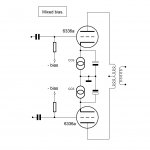Hi,
I've some 6336a and 6AS7 regulator triodes that I'd like to use for a PP amp.
The thing that holds me back is the large bias voltage needed and hence the large dissipation in the cathode resistor because according to the datasheet negative grid bias can't be used.
So I was thinking : can I use a combination of grid and cathode bias where cathode resistors are replaced by a CCS with a DN2540 to force each triode to the correct current and use some negative grid bias to reduce the dissipation of the CCS and in the meantime have a somewhat higher anode voltage.
Here is what I have in mind:

I've some 6336a and 6AS7 regulator triodes that I'd like to use for a PP amp.
The thing that holds me back is the large bias voltage needed and hence the large dissipation in the cathode resistor because according to the datasheet negative grid bias can't be used.
So I was thinking : can I use a combination of grid and cathode bias where cathode resistors are replaced by a CCS with a DN2540 to force each triode to the correct current and use some negative grid bias to reduce the dissipation of the CCS and in the meantime have a somewhat higher anode voltage.
Here is what I have in mind:

Hi,
I've some 6336a and 6AS7 regulator triodes that I'd like to use for a PP amp.
The thing that holds me back is the large bias voltage needed and hence the large dissipation in the cathode resistor because according to the datasheet negative grid bias can't be used.
So I was thinking : can I use a combination of grid and cathode bias where cathode resistors are replaced by a CCS with a DN2540 to force each triode to the correct current and use some negative grid bias to reduce the dissipation of the CCS and in the meantime have a somewhat higher anode voltage.
Here is what I have in mind:
View attachment 543772
There is an article from Glass Audio which use cathode bias, let's try to read it. There are some use fixed bias as well.
Last edited:
I've used 6AS7/6080 types successfully in class AB2 push-pull parallel with fixed bias. Power output at clipping reaches 30W in my Perveant design, which achieves bias stability by direct coupling from a very low impedance source to the grids. Paralleled 6AS7 triodes don't share current equally when idling, but 22R cathode resistors are sufficient to enforce good sharing under high drive conditions. The OPT primary is nominally 1K CT.
Attachments
The 6336 data sheets I have don't rule out grid bias, but they specify that a certain minimum percentage of total bias be got from a cathode resistor, even if fixed bias is used. I've used this tube enough to know why - Wanderlust ! Some of them just don't like to stay in one place for too long. (Go horsey go!)
I did a sorta similar version of the GlassAudio article amp, . . . . .well , let's say it was inspired by the article. I already had a bunch of 6336's (from a DEW line station, rejects I think) most with laughingly badly matched sections. To get around both conditions I used my own config of Walt Jung's regulator using a 431 from his "Sources 101" part 2. One reg under each cathode with the pass mosfets both mounted on the same heatsink. Then the two cathodes were cap coupled to each other.
Finely tuneable and rock solid. I ended up using a couple of resistors above the CCS to limit dissipation on the undersize heatsink I had. The circuit works well.
I did a sorta similar version of the GlassAudio article amp, . . . . .well , let's say it was inspired by the article. I already had a bunch of 6336's (from a DEW line station, rejects I think) most with laughingly badly matched sections. To get around both conditions I used my own config of Walt Jung's regulator using a 431 from his "Sources 101" part 2. One reg under each cathode with the pass mosfets both mounted on the same heatsink. Then the two cathodes were cap coupled to each other.
Finely tuneable and rock solid. I ended up using a couple of resistors above the CCS to limit dissipation on the undersize heatsink I had. The circuit works well.
...So I was thinking : can I use a combination of grid and cathode bias where cathode resistors are replaced by a CCS...
I think that you can.
A CCS even at a fraction of the bias voltage compensates the idle current drift better than any cathode resistor.
I ended up using a couple of resistors above the CCS to limit dissipation on the undersize heatsink I had. The circuit works well.
That's what I want to avoid by using some negative grid bias. Keep the cathode bias dissipation to a minimum.
- Status
- Not open for further replies.
- Home
- Amplifiers
- Tubes / Valves
- Mixed bias for 6336a or 6AS7 output tubes?